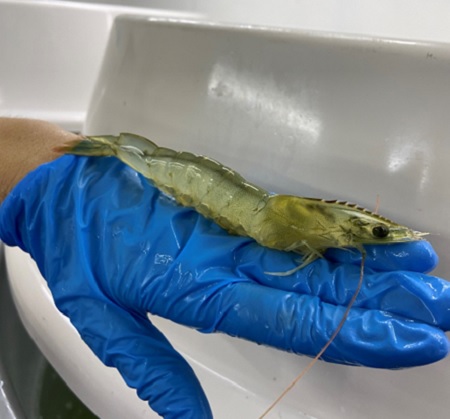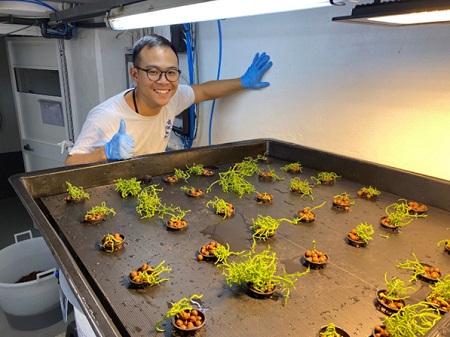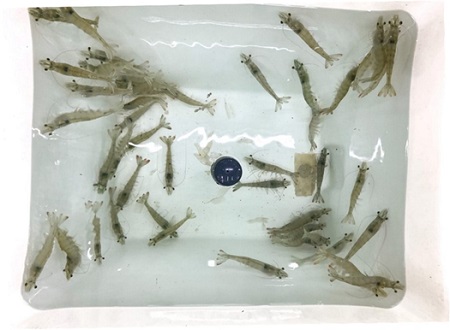
Register with Plumtri!
Register on plumtri as an Individual or as an Organisation to gain access to all of its useful features and remain updated on the latest R&I news, events and funding opportunities.
-
 Welcome to plumtriA platform for Research & Innovation
Welcome to plumtriA platform for Research & Innovation -
 Looking for Funding?Check out the current open calls
Looking for Funding?Check out the current open calls -
 Register today to start receiving our monthly newsletter
Register today to start receiving our monthly newsletter -
 Looking to partner up?Search our list of registered profiles
Looking to partner up?Search our list of registered profiles -
 You have questions on a particular funding programme?
You have questions on a particular funding programme?
Project: BIORAS_SHRIMP - a Contribution to the Innovation of Shrimp Farming in Europe

The Maltese consultancy company AquaBioTech Group is a major partner in a project that focuses on the development of an innovative farming system for the intense, yet sustainable, production of shrimps. The project’s name is BIORAS_SHRIMP, it is co-funded by BlueBio – ERANET and it is a joined effort between 10 partners from Italy, Malta, Norway and India. The aim of the project is to develop, improve, and innovate a bio-secure, land-based, sustainable shrimp culture model to minimise waste, enhance productivity, and recover energy and nutrients. The project applies Integrated bio-systems principles in the view of a circular economy process and it aims at developing a Recirculating Aquaculture System (RAS) to grow shrimps at high density, minimising water pollution. RASs are modern systems for the aquaculture of fish, where water is circulated between multiple tanks linked together and connected to filters to remove the solid waste and to a biofilter where nitrifying bacteria convert the toxic ammonium excreted by the fish into more tolerated nitrates. In this way, the water can be re-used for extended time to support the fish growth.
The high demand of shrimps has led to rapid expansion of production all over the world. Shrimp fishing is not a sustainable activity, shrimp aquaculture should be preferred as it alleviates pressure on wild stock and reduces the environmental impact associated with fishing for this species. Intensive shrimp aquaculture is practiced in several Asian and South American countries; however, global shrimp trade is associated with large carbon emissions.
The development of a climate-neutral and resilient farming system in Europe is fundamental to provide consumers with affordable, safe, traceable, and healthy shrimps, while minimizing the pressure on ecosystems. The model under development will use Artificial Intelligence to optimize the production process and the management of effluents and of solid waste. AquaBioTech Group, in collaboration with the other partners, designed and performed experiments finalised to improve the husbandry of the shrimps by enhancing biosecurity and optimising the feed intake and other important parameters that impact health, quality and production of shrimps.
AquaBioTech Group is also investigating the use of the sludge (the solid waste constituted by faeces and uneaten feed) to produce bioflocs. Bioflocs are agglomerates of bacteria, microalgae, and organic matter that feeds on sludge and they can be used as live feed for the farmed shrimps. Inclusion of bioflocs in the shrimp’s diet has a positive effect on the shrimp immune system and can contribute to disease control.
Moreover, the Maltese company is testing the use of the effluents rich in nutrients to grow Salicornia europea, an edible and tasty plant used for salads that has a high tolerance to increased salinity. These plants can remove nutrients from the effluent of the RAS reducing the impact of the shrimp farming on natural waters. While another partner of the project is testing the utilization of the shrimp effluents to grow protein-rich microalgae.
The Maltese Department for Fisheries and Aquaculture (DFA) is also a partner of BIORAS_SHRIMP. AquaBioTech Group designed a pilot-scale Recirculating Aquaculture System for Shrimp farming that is currently under construction in Forti San Luċjan, where DFA has its headquarters. A full-scale shrimp farm is under construction in Gela, Sicily (Italy). The design and realization of the farms are based on the findings of the work done In Malta by AquaBioTech group and in Norway, Italy and India from by the other partners to optimize all the aspects of the production process and integrate the production of additional biomass. The shrimp farm in Gela will represent a system for farming of shrimp and additional biomass that will be unique in Europe.
The project has received funding from the European Union’s Horizon 2020 research and innovation programme under grant agreement 817992. Project PROFIUS is funded by the Malta Council for Science and Technology through the BlueBio ERA-NET co-fund scheme.
About Blue Bio ERA-NET co-fund:
The Blue Bio COFUND is the result of a collaboration between JPI Oceans and the former ERA-NETS COFASP and ERA MBT and consists of 27 partners from 16 countries.
The main objective of the COFUND is to establish a coordinated R&D funding scheme that will strengthen Europe’s position in the blue bioeconomy. The first co-funded call launched 17 December 2018. The COFUND partners have committed EUR 23,5 million, which will make up a maximum total budget of EUR 30 million including EUR 6.5 million co-funding from the European Commission.
The goal is to identify new and improve existing ways of bringing bio-based products and services to the market and find new ways of creating value from in the blue bioeconomy. Next to the co-funded call, the COFUND plans to contribute to the national priorities as well as to the strategic research agenda of JPI Oceans, and the ERA-NETs COFASP and MBT.
https://bluebioeconomy.eu/about-2/

Hydroponic growth of Salicornia europea on shrimps’ effluent

Whiteleg shrimp, Litopenaeus vannamei, in experimental tank at AquaBioTech Group’s facilities.
Download the official press release from the below link.
Information, images and video source:
Attachment: External Link
